Related Research Articles

The Bantu languages are a language family of about 600 languages that are spoken by the Bantu peoples of Central, Southern, Eastern and Southeast Africa. They form the largest branch of the Southern Bantoid languages.
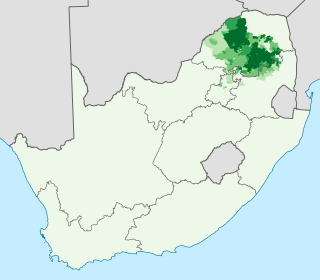
Sepedi, formerly known by as Sesotho sa Leboa, is a Sotho-Tswana language group spoken in the northeastern provinces of South Africa. It is commonly referred to in its standardized form as Pedi or Sepedi and holds the status of an official language in South Africa.

Tswana, also known by its native name Setswana, and previously spelled Sechuana in English, is a Bantu language spoken in Southern Africa by about 8.2 million people. It belongs to the Bantu language family within the Sotho-Tswana branch of Zone S (S.30), and is closely related to the Northern Sotho and Southern Sotho languages, as well as the Kgalagadi language and the Lozi language.
SothoSesotho, also known as Southern Sotho or Sesotho sa Borwa is a Southern Bantu language of the Sotho–Tswana ("S.30") group, spoken in Lesotho, and South Africa where it is an official language;

Tsonga or, natively, Xitsonga, as an endonym, is a Bantu language spoken by the Tsonga people of South Africa. It is mutually intelligible with Tswa and Ronga and the name "Tsonga" is often used as a cover term for all three, also sometimes referred to as Tswa-Ronga. The Xitsonga language has been standardised for both academic and home use. Tsonga is an official language of South Africa, and under the name "Shangani" it is recognised as an official language in the Constitution of Zimbabwe. All Tswa-Ronga languages are recognised in Mozambique. It is not official in Eswatini.
The Sotho-Tswana languages are a group of closely related Bantu languages spoken in Southern Africa. The Sotho-Tswana group corresponds to the S.30 label in Guthrie's 1967–71 classification of languages in the Bantu family.
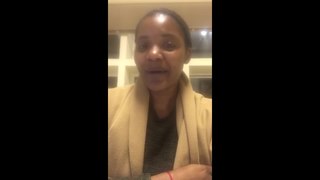
Lozi, also known as siLozi and Rozi, is a Bantu language of the Niger–Congo language family within the Sotho–Tswana branch of Zone S (S.30), that is spoken by the Lozi people, primarily in southwestern Zambia and in surrounding countries. This language is most closely related to Northern Sotho, Tswana (Setswana), Kgalagari (SheKgalagari) and Sotho. Lozi, sometimes written as Rotse, and its dialects are spoken and understood by approximately six per cent of the population of Zambia. Silozi is the endonym as defined by the United Nations. Lozi is the exonym.
Sotho may refer to:
The Northern Ndebele people are a Nguni ethnic group native to Southern Africa. Significant populations of native speakers of the Northern Ndebele language (siNdebele) are found in Zimbabwe. Another Northern Ndebele group is found in the Limpopo province of South Africa, unrelated to those in Zimbabwe but instead related to the Southern Ndebele people as descendants of the same ancestral kings, Musi kaMhlanga and Ndebele KaMabhudu. The Northern Ndebele people of South Africa are concentrated in the towns of Polokwane, Zebediela, Mokopane, and Hamanskraal.

The Sotho-Tswana, also known as the Sotho or Basotho, although the term is now closely associated with the Southern Sotho peoples are a meta-ethnicity of Southern Africa. They are a large and diverse group of people who speak Sotho-Tswana languages. The group is predominantly found in Botswana, Lesotho, South Africa, and the western part of Zambia. Smaller groups can also be found in Namibia and Zimbabwe.

In many parts of sub-Saharan Africa, the use of music is not limited to entertainment: it serves a purpose to the local community and helps in the conduct of daily routines. Traditional African music supplies appropriate music and dance for work and for religious ceremonies of birth, naming, rites of passage, marriage and funerals. The beats and sounds of the drum are used in communication as well as in cultural expression.
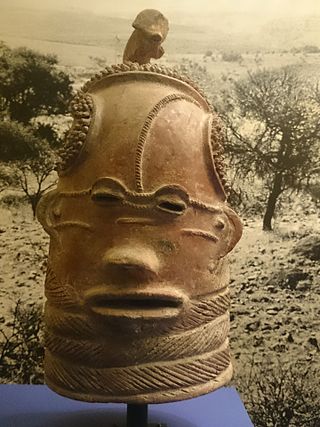
South African Bantu-speaking peoples represent the majority ethno-racial group of South Africans. Occasionally grouped as Bantu, the term itself is derived from the English word "people", common to many of the Bantu languages. The Oxford Dictionary of South African English describes "Bantu", when used in a contemporary usage or racial context as "obsolescent and offensive", because of its strong association with the "white minority rule" with their Apartheid system. However, Bantu is used without pejorative connotations in other parts of Africa and is still used in South Africa as the group term for the language family.
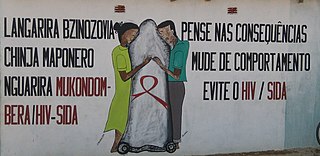
Mozambique is a multilingual country. A number of Bantu languages are indigenous to Mozambique. Portuguese, inherited from the colonial period, is the official language, and Mozambique is a full member of the Community of Portuguese Language Countries. Ethnologue lists 43 languages spoken in the country.
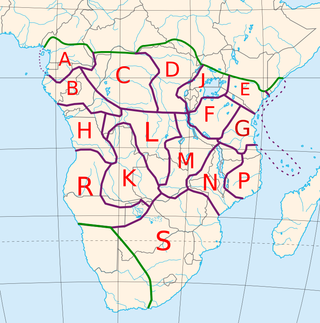
The 250 or so "Narrow Bantu languages" are conventionally divided up into geographic zones first proposed by Malcolm Guthrie (1967–1971). These were assigned letters A–S and divided into decades ; individual languages were assigned unit numbers, and dialects further subdivided. This coding system has become the standard for identifying Bantu languages; it was a practical way to distinguish many ambiguously named languages before the introduction of ISO 639-3 coding, and it continues to be widely used. Only Guthrie's Zone S is (sometimes) considered to be a genealogical group. Since Guthrie's time a Zone J has been set up as another possible genealogical group bordering the Great Lakes.
The Makua or Makhuwa languages are a branch of Bantu languages spoken primarily in Mozambique.
Tswa (Xitswa) is a South-Eastern Bantu language in Southern Mozambique. Its closest relatives are Ronga and Tsonga, the three forming the Tswa–Ronga family of languages.
The Tswa–Ronga languages are a group of closely related Southern Bantu languages spoken in Southern Africa chiefly in southern Mozambique, northeastern South Africa and southeastern Zimbabwe.
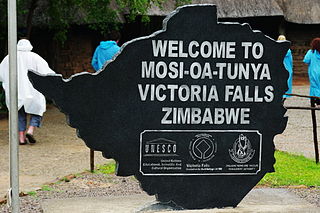
Many languages are spoken, or historically have been spoken, in Zimbabwe. Since the adoption of its 2013 Constitution, Zimbabwe has 16 official languages, namely Chewa, Chibarwe, English, Kalanga, Koisan, Nambya, Ndau, Ndebele, Shangani, Shona, sign language, Sotho, Tonga, Tswana, Venda, Xhosa. The country's main languages are Shona, spoken by over 82% of the population, and Ndebele, spoken by roughly 15%. English is the country's lingua franca, used in government and business and as the main medium of instruction in schools. English is the first language of most white Zimbabweans, and is the second language of a majority of black Zimbabweans. Historically, a minority of white Zimbabweans spoke Afrikaans, Greek, Italian, Polish, and Portuguese, among other languages, while Gujarati and Hindi could be found amongst the country's Indian population. Deaf Zimbabweans commonly use one of several varieties of Zimbabwean Sign Language, with some using American Sign Language. Zimbabwean language data is based on estimates, as Zimbabwe has never conducted a census that enumerated people by language.
The Lomwe (Lowe) language, Elomwe, also known as Western Makua, is the fourth-largest language in Mozambique. It belongs with Makua in the group of distinctive Bantu languages in the northern part of the country: The Makhuwa-using area proper is separated by a large Lomwe-speaking area from the related eChuwabo, although eMakhuwa neighbours eChuwabo in a more coastal zone. To the south, the rather more distantly related Sena (ChiSena) should be assigned to a group with Nyanja and Chewa, while the distinct group which includes Yao, Makonde and Mwera is found to the north. Apart from the regional variations found within eMakhuwa proper, eLomwe uses ch where tt appears in eMakhuwa orthography: for instance eMakhuwa mirette ("remedy") corresponds to eLomwe mirecce, eMakhuwa murrutthu to eLomwe miruchu, eMakhuwa otthapa ("joy") to eLomwe ochapa.

Mthwakazi is the traditional name of the proto-Ndebele people and Ndebele kingdom and is in the area of today's Zimbabwe. Mthwakazi is widely used to refer to inhabitants of Matebeleland Province in Zimbabwe.
References
- ↑ Tore Janson (1991-92) "Southern Bantu and Makua", Sprache und Geschichte in Afrika (SUGIA) Vol. 12/13: 63-106, Rüdiger Köppe Verlag, Cologne